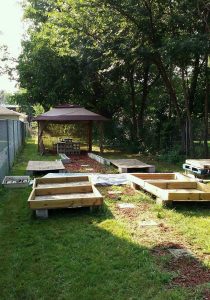Faith and Health Leadership: Best Practices Congregational Church of Park Manor
A workshop on gardening guides Rev. Terrill Murff to repurpose vacant land in the middle of a food desert
In 2012, Reverend Terrill Murff attended a Gardening “How-to” Workshop hosted by the Center for Faith and Community Health Transformation at Covenant United Church of Christ in South Holland.
At the time, Rev. Murff was working with church youth on a beautification project in South Holland.
“The gardening workshop was good for the kids who went through it there because they had a better sense of stewardship. And for one child in particular… it had a lasting impact on her, relationally and emotionally. It drew her into the community, drew her closer to us.”
But it also planted the seeds, so to speak, for a grander vision. Later that year, Rev. Murff left Covenant UCC to become the Senior Pastor at Congregational Church of Park Manor in Chicago. Once there, ideas came into focus.
“We [Park Manor Church] had bought a parcel of land to be a parking lot in 2010. It’s in the middle of the block, not zoned for parking, so it just sat there. After arriving at Park Manor, and after attending the gardening workshop, I thought, ‘Why not do a community garden?’”
Park Manor, a part of the Grand Crossing area on the Southside of Chicago, is lacking in grocery stores. The church is center in an approximately mile-wide food desert. There are a lot of vacant lots in the blocks surrounding the church. Murff enlisted the assistance of Isaac Hayes, a pastoral intern from McCormick Theology Seminary now serving his second year at Park Manor.
Hayes started building the garden this spring with the help of a $5000 investment gift from Covenant UCC as part of the Young Prophet Project. They are putting in a solar generator, and then will be ready for starter plants in 2016.
The mission of the project is education. “Initially, we are planting a food garden. We have all the different foods we are going to offer. We are teaching them sustainability; how to thrive in a community where food deserts exits; we’re teaching how to become a self-sustaining community by growing their own fruits and vegetables….the kids would not only do the labor, but also learn.”
But the garden is also an instrumental part of relating to people differently, and valuing people differently. “We are really trying to build up the self-worth of the individual here. There are strong, dominant voices here that are so strong that they’ve drowned out the voices of the individual. Now, when the others see they too have a voice, they feel valued.”
Murff has been reaching out to the community and getting a good response. The Alderman likes that they will be doing something with a vacant lot. The kids like it. He says “the church has embraced it (because I keep talking about it).”
Murff also spoke to a local corner store about selling some of the produce in their store. The discussion is in progress, but he feels optimistic about opportunities to steward the larger community.
“The culture here is changing….No matter how well the strategies are planned, no wonder how well they are implemented, 95% of the time they will run up against the culture of the church, and the culture will win. So, unless you change the culture of the church, it will be hard to implement any other type of growth. So the culture is changing. [And] the people here have embraced change. It’s difficult for our elders and seniors to change. They are comfortable with the way things are, they like the way things are. So they are embracing the change – that’s huge for me here.”




